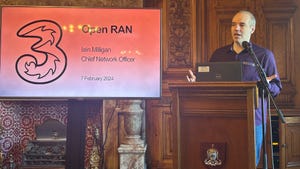Eurobites: UK mobile operators face £3.3B class action over 'loyalty penalties'
Also in today's EMEA regional roundup: Vivacom, OneWeb launch ground station in Bulgaria; Ofcom consults on network resilience; fiber rollout slows to a snail's pace in France.
.jpg?width=850&auto=webp&quality=95&format=jpg&disable=upscale)
A long-time campaigner for consumer rights has launched a class action against the UK's four mobile network operators, accusing them of effectively imposing "loyalty penalties" by continuing to take payments for handsets that, according to the terms of the original contract, have already been paid for. As the Guardian reports, Justin Gutmann has joined forces with law firm Charles Lyndon to kick-start the £3.3 billion (US$4.1 billion) lawsuit, which the plaintiffs say could affect around 5 million consumers across more than 28 million current and historical mobile phone contracts, with each of the affected consumers standing to receive as much as £1,800 ($2,264) should the class action prove successful. In recent months, one of the four companies targeted in the class action, Virgin Media O2, has been trying to present itself as something of a consumer champion on this issue, repeatedly accusing its rivals of carrying out a "smartphone swindle."
Vivacom and satellite Internet company Eutelsat OneWeb have switched on their ground station in Stara Zagora, Bulgaria, the fourth of its kind in Europe, according to OneWeb. The ground station consists of 18 antennas and a mini data center that connects the OneWeb's low Earth orbit satellites to the optical network and data centers in Bulgaria and other parts of Europe. OneWeb, at one time co-owned by the UK government and India's Bharti Global, merged with France-based Eutelsat in September.
Ofcom, the UK communications regulator, has launched a consultation on the issue of network resilience with a view to updating its guidance on the matter and ultimately reducing outages. The consultation includes a separate call for input on what power backup mobile network operators should provide for their radio access networks, a benchmark that does not currently feature in Ofcom's guidance to the industry.
The pace of fiber rollout in France continues to slow, according to the latest scorecard produced by communications regulator Arcep. Over the course of Q3 2023, 825,000 additional premises were passed for fiber-to-the-home – 25% fewer than in the same period last year. In nationwide terms, fiber coverage only increased by one percentage point during the quarter, to 84%. The slowdown was particularly stark in very high-density areas, with fewer than 24,000 additional premises passed – or three times fewer than in Q3 2022.
Worldstream, a Dutch infrastructure-as-a-service company, has chosen Nokia to upgrade said infrastructure from 100GE to 400GE port speeds with, says Nokia, an "immediate path" to 800GE. Worldstream will deploy Nokia's 7750 Service Router (SR) platforms.
Omdia, a sister company to Light Reading as it happens, has named former Nokia unit HERE Technologies as the leader in its location-services field in the 2023 Location Platform Index, leaving the likes of Google and TomTom in its wake.
The UK government has launched a review into how the BBC is funded in the face of the changing media landscape. The review, says the government in a statement, "will look at how alternative models could help secure the broadcaster's long-term sustainability amid an evolving media landscape, increased competition and changing audience behaviour, while reducing the burden on licence fee payers." In 2022, the government froze the annual licence fee for two years but in April 2024 it will increase to £169.50 ($213.21).
Read more about:
EuropeAbout the Author(s)
You May Also Like












